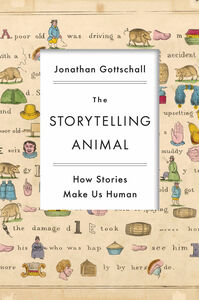Take a photo of a barcode or cover
This book is okay. It's written in a light, humorous tone with interesting supplemental photographs. It is not, however, the fantastic resource for my research that I'd hoped it might be. I'm not completely through the book yet, but the author spends a lot of time repeating himself.
Most of the first 1/2 of the book, in fact, seems to be spent in convincing us WHY this is an important area of study. Already there, buddy! Now get to some more detailed information, please!
As a person already interested in this subject, I'd already learned much of the information presented in the text thus far. I think it would be great for someone first learning about/thinking about this concept, but it doesn't provide much new information for those who have already been reading related texts. I'm likely to learn more by browsing the bibliography and investigating some of his sources further on my own.
I still recommend this book for a few interesting tidbits, but it is certainly a fast "overview" read on the subject.
Most of the first 1/2 of the book, in fact, seems to be spent in convincing us WHY this is an important area of study. Already there, buddy! Now get to some more detailed information, please!
As a person already interested in this subject, I'd already learned much of the information presented in the text thus far. I think it would be great for someone first learning about/thinking about this concept, but it doesn't provide much new information for those who have already been reading related texts. I'm likely to learn more by browsing the bibliography and investigating some of his sources further on my own.
I still recommend this book for a few interesting tidbits, but it is certainly a fast "overview" read on the subject.
informative
inspiring
lighthearted
fast-paced
informative
lighthearted
reflective
fast-paced
Starts off strong, then slowly fizzles out. This is definitely an interesting read for those interested in Story and the human experience...on the other hand, those with an academic background on the subject might be disappointed. At less than 200 pages, it's a quick and (somewhat) worthwhile read.
There are two stars to give: one for the insightful descriptions of some of the experiments mentioned in the book, for example regarding left and right brain functions, the other for his discussion of the relation between stories in the virtual world and the real one towards the end of the book. Especially the escapist temptations of these virtual worlds to people caught in bleak meaningless lives in the real one.
Why the writer takes half the book to search for the meaning of stories only to come to a conclusion that is neither complete nor original is difficult for me to understand. I do have to mention my familiarity with the works of Joseph Campbell and C.J. Jung, so I've read about the 4 functions of myth. I've also read a bit on dream interpretation and the way mr. Gottschall discards Freud's work on the subject in a by-sentence, without any mention of Jung's work leaves me to conclude the writer either did not do any real research or deliberately ignored it because it wouldn't leave him with anything novel to conclude. (By the way he concludes the chapter by interpreting his own dream in much the same way as Jung would have..he might want to look into it..)
My other problem is the tendency of the writer to quote some supposed expert on a subject, then state his own opinion without any real logical argument or deduction to back up his point of view.
It's all informative enough to read and the pace and narration are decent, but it all seems very incomplete and superficial.
Why the writer takes half the book to search for the meaning of stories only to come to a conclusion that is neither complete nor original is difficult for me to understand. I do have to mention my familiarity with the works of Joseph Campbell and C.J. Jung, so I've read about the 4 functions of myth. I've also read a bit on dream interpretation and the way mr. Gottschall discards Freud's work on the subject in a by-sentence, without any mention of Jung's work leaves me to conclude the writer either did not do any real research or deliberately ignored it because it wouldn't leave him with anything novel to conclude. (By the way he concludes the chapter by interpreting his own dream in much the same way as Jung would have..he might want to look into it..)
My other problem is the tendency of the writer to quote some supposed expert on a subject, then state his own opinion without any real logical argument or deduction to back up his point of view.
It's all informative enough to read and the pace and narration are decent, but it all seems very incomplete and superficial.
informative
reflective
relaxing
slow-paced
I liked this one! A quick and fun read about fictions role in our lives and our evolution as a species. Gottschall uses emotional narrative to exemplify his points throughout the book which adds to the experience. On the downside it just brushes on the surface when it comes to the "sciency" stuff and thus promises alot more than it delivers. It does contain enough interesting points though!
informative
fast-paced
Interesting read, and helpful in seeing how everything around us is part of storytelling.
An insightful book written in approachable language that was enjoyable and interesting to read. It was so fascinating to understand why we are drawn to stories like moths to a flame. Gottschall made me consider just how much stories are intertwined with our waking and sleeping hours. I love reading books about books and this one really took it to a fundamental level about the experience of reading and absorbing stories in other ways. A pretty short and engaging read, I’d highly recommend giving it a try.
Looking through other reviews, I will say that the author is approaching this topic from more of a cultural standpoint—it’s no groundbreaking data experiment—but I think that provides value as the humanities and sciences always have more to learn from each other.
Looking through other reviews, I will say that the author is approaching this topic from more of a cultural standpoint—it’s no groundbreaking data experiment—but I think that provides value as the humanities and sciences always have more to learn from each other.
hopeful
informative
reflective
medium-paced




